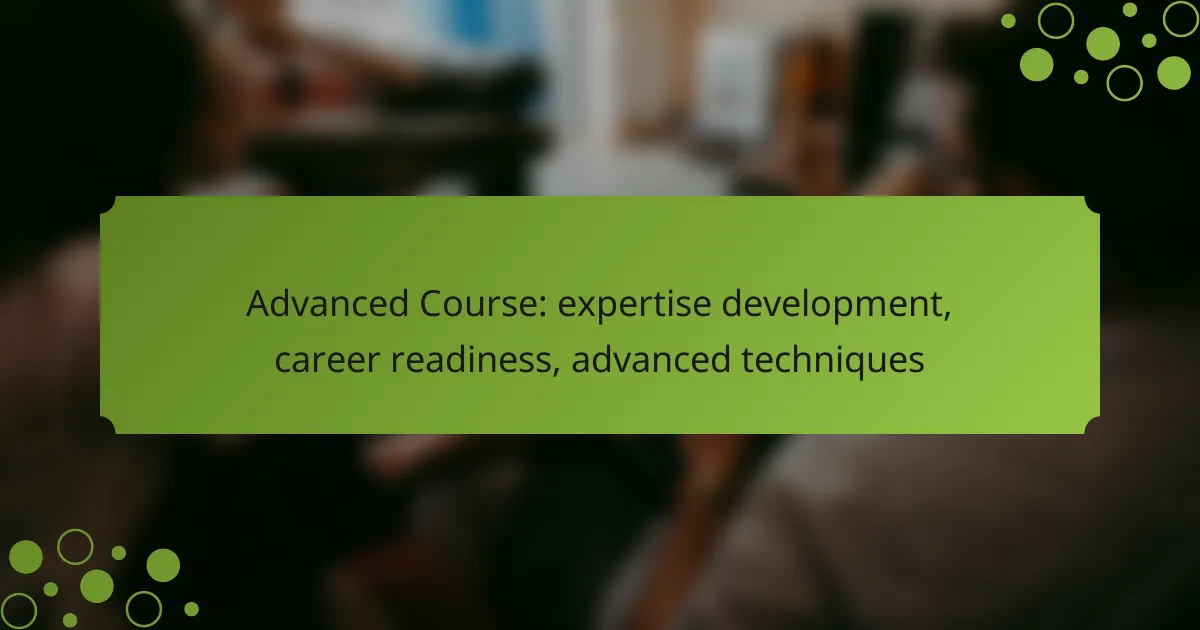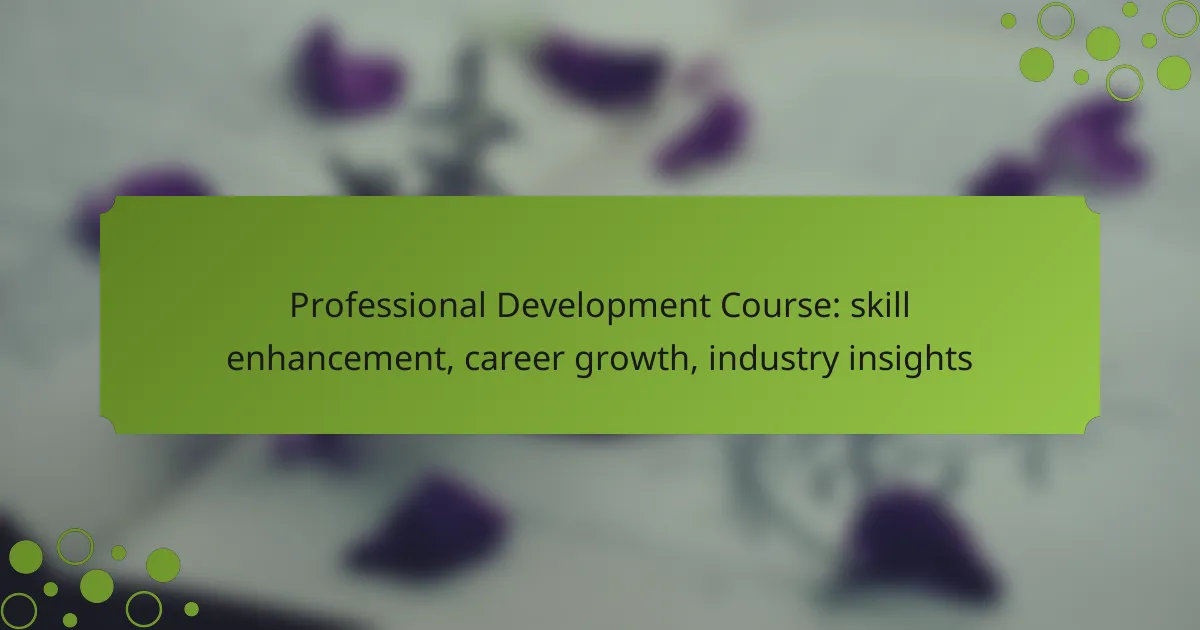Advanced courses play a crucial role in enhancing career readiness by providing specialized skills and knowledge tailored to meet industry demands. By focusing on practical applications and advanced techniques such as data analysis and project management, these programs equip individuals with a competitive edge in the job market. Enrollment typically requires foundational knowledge and relevant experience, ensuring participants can effectively engage with the material and maximize their learning outcomes.

How can advanced courses enhance career readiness in Canada?
Advanced courses can significantly enhance career readiness in Canada by equipping individuals with specialized skills and knowledge that align with industry demands. These programs often focus on practical applications and provide a competitive edge in the job market.
Skill development through specialized training
Advanced courses offer targeted training that helps individuals develop specific skills relevant to their chosen field. For example, a course in data analytics may cover tools like Python and SQL, which are highly sought after in various industries.
Participants can expect to engage in hands-on projects, case studies, and simulations that mirror real-world challenges. This practical experience not only solidifies learning but also prepares students for immediate contributions in their roles.
Networking opportunities with industry professionals
Many advanced courses provide access to a network of industry professionals, including guest speakers, mentors, and alumni. These connections can lead to valuable insights, job referrals, and collaborations that enhance career prospects.
Engaging with professionals during workshops or networking events allows participants to build relationships that may prove beneficial long after the course ends. It’s advisable to actively participate and follow up with contacts made during these events.
Certification recognition by employers
Completing an advanced course often results in a certification that is recognized by employers, enhancing an individual’s credibility. Certifications can demonstrate a commitment to professional development and a mastery of relevant skills.
In Canada, certain certifications may be particularly valued in sectors like technology, healthcare, and finance. Researching which certifications are most respected in your field can guide your course selection and career strategy.

What advanced techniques are taught in online courses?
Online courses often cover advanced techniques that enhance expertise development and career readiness. These techniques include data analysis, project management methodologies, and advanced communication strategies, which are essential for navigating complex work environments.
Data analysis and interpretation
Data analysis and interpretation involve collecting, processing, and deriving insights from data to inform decision-making. Courses typically teach statistical methods, data visualization tools, and software like Excel or R to help learners analyze trends and patterns effectively.
Key steps include defining the problem, gathering relevant data, applying analytical techniques, and interpreting results. For example, using regression analysis can help predict future trends based on historical data.
Common pitfalls include misinterpreting data or overlooking context, which can lead to incorrect conclusions. Always validate your findings with multiple data sources to ensure accuracy.
Project management methodologies
Project management methodologies provide structured approaches to planning, executing, and completing projects efficiently. Popular methodologies include Agile, Waterfall, and Scrum, each suited for different types of projects and team dynamics.
Understanding the strengths and weaknesses of each methodology is crucial. For instance, Agile is ideal for projects requiring flexibility and rapid iteration, while Waterfall is better for projects with clear, sequential phases.
To succeed, familiarize yourself with project management tools like Trello or Asana, and ensure clear communication among team members. Avoid scope creep by defining project goals and deliverables upfront.
Advanced communication strategies
Advanced communication strategies focus on enhancing interpersonal skills, persuasive techniques, and effective presentation methods. These skills are vital for leaders and team members to convey ideas clearly and influence stakeholders.
Courses often cover active listening, non-verbal communication, and conflict resolution techniques. For example, practicing active listening can improve team collaboration and reduce misunderstandings.
To improve your communication, seek feedback on your presentations and adapt your style based on audience needs. Avoid jargon unless necessary, and always aim for clarity to ensure your message is understood.

What are the prerequisites for enrolling in advanced courses?
To enroll in advanced courses, students typically need foundational knowledge in the subject area, relevant prior coursework or certifications, and some professional experience. These prerequisites ensure that participants can fully engage with the course material and benefit from advanced techniques.
Basic knowledge of the subject area
A solid understanding of the fundamental concepts in the subject area is crucial for success in advanced courses. This knowledge allows students to grasp complex topics and apply advanced techniques effectively. For instance, a student enrolling in an advanced programming course should be familiar with basic programming languages and concepts.
To assess your readiness, consider reviewing introductory materials or taking preliminary courses. Many institutions offer online resources or workshops that can help bridge any gaps in knowledge before advancing.
Previous coursework or certifications
Having completed relevant coursework or obtained certifications is often a requirement for advanced courses. This background demonstrates a commitment to the field and ensures that students possess the necessary skills to tackle more challenging content. For example, a certification in project management may be required for an advanced project management course.
Check the specific requirements of the course you are interested in, as they can vary widely. Some programs may accept equivalent experience in lieu of formal education, so it’s worth inquiring about alternative qualifications.
Professional experience in the field
Professional experience is highly valued in advanced courses, as it provides practical context for theoretical concepts. Many programs expect students to have hands-on experience that relates to the course material, which enhances discussions and collaborative projects. For instance, a candidate for an advanced marketing course should have experience in marketing strategies or campaigns.
Consider documenting your relevant work experience, including internships, volunteer work, or job roles, to present a strong case for your enrollment. Engaging in professional networks or industry events can also help you gain insights and connections that may support your application.

How do online courses compare to traditional education for expertise development?
Online courses offer a flexible and accessible alternative to traditional education, making them increasingly popular for developing expertise. They allow learners to tailor their education to fit their personal and professional needs, often at a lower cost.
Flexibility in learning pace
Online courses enable learners to progress at their own speed, which can enhance understanding and retention of material. Unlike traditional classrooms, where the pace is set by the instructor, students can spend more time on challenging topics or accelerate through familiar content.
This flexibility is particularly beneficial for working professionals who may need to balance their studies with job responsibilities. Setting a personal schedule allows for a more manageable learning experience.
Access to a wider range of resources
Online education platforms often provide access to a diverse array of resources, including video lectures, interactive quizzes, and forums for discussion. This variety can enrich the learning experience and cater to different learning styles.
Additionally, many online courses incorporate materials from industry experts and thought leaders, offering insights that may not be available in traditional educational settings. This exposure can be crucial for staying current in rapidly evolving fields.
Cost-effectiveness of online platforms
Online courses typically have lower tuition fees compared to traditional education, making them a more affordable option for many learners. Costs associated with commuting, housing, and materials are often reduced or eliminated.
Many platforms also offer free courses or financial aid options, further increasing accessibility. This cost-effectiveness allows individuals to invest in their education without incurring significant debt, which is a common concern with traditional degree programs.

What are the top online platforms for advanced courses in Canada?
In Canada, several online platforms offer advanced courses that cater to various professional and academic needs. Key platforms include Coursera, edX, and LinkedIn Learning, each providing unique features and course offerings that enhance expertise development and career readiness.
Coursera for specialized certifications
Coursera partners with top universities and organizations to offer specialized certifications that can significantly enhance your qualifications. These courses often focus on specific skills or industries, making them ideal for professionals looking to advance in their careers.
When choosing a certification, consider the reputation of the institution offering the course and the relevance of the skills taught. Many courses are available in both English and French, catering to Canada’s bilingual population.
edX for university-level courses
edX provides access to university-level courses from prestigious institutions, allowing learners to deepen their knowledge in various fields. These courses often include rigorous academic content and can be taken for credit or as part of a MicroMasters program.
Look for courses that align with your career goals and consider whether you want a verified certificate, which may involve a fee. Many edX courses are available for free, but a fee is typically required for certification.
LinkedIn Learning for professional skills
LinkedIn Learning focuses on professional skills and offers a vast library of courses that cater to various industries. This platform is particularly useful for those looking to acquire practical skills quickly, with courses often lasting from a few hours to several days.
Utilize the platform’s personalized recommendations based on your LinkedIn profile to find relevant courses. Subscriptions are available on a monthly basis, making it easy to access a wide range of topics without a long-term commitment.

How do advanced courses support lifelong learning?
Advanced courses play a crucial role in lifelong learning by providing updated knowledge and skills that align with evolving industry demands. They empower individuals to stay competitive in their careers and adapt to new challenges through specialized training and practical applications.
Continuous skill updates for career advancement
Continuous skill updates are essential for career advancement, as industries frequently change due to technological advancements and market trends. Advanced courses offer targeted training that helps professionals acquire the latest skills relevant to their fields, ensuring they remain valuable assets to their employers.
For instance, a software developer might take an advanced course in artificial intelligence to enhance their programming capabilities. This not only improves their job performance but also opens up new career opportunities, such as roles in data science or machine learning.
To maximize the benefits of continuous skill updates, professionals should regularly assess their skill sets against industry standards and seek courses that fill gaps. Networking with peers and industry leaders can also provide insights into which skills are in high demand, guiding course selection.



